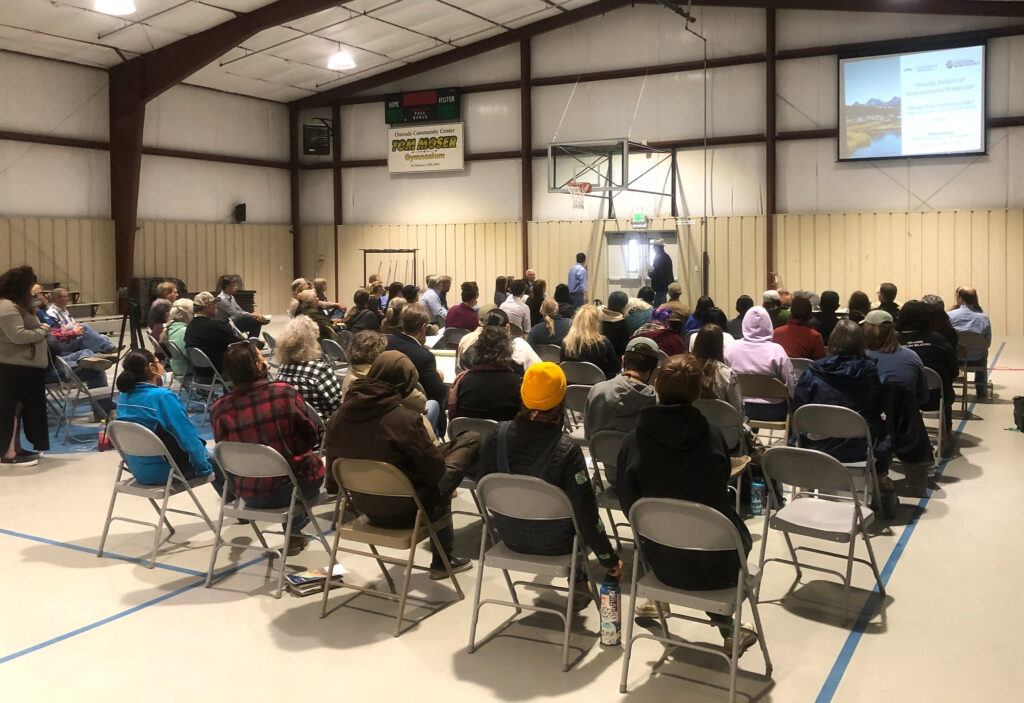Right now, some Members of Congress are negotiating a dirty side deal aimed toward limiting the public’s voice in government mining decisions. A leaked draft bearing the watermark of the American Petroleum Institute describes the wishlist for all extractive industries—more mining, less community input. The politicians working on this deal plan to attach it to an unrelated funding bill to keep the government open.
The Art of the Deal
The National Environmental Policy Act (NEPA) requires that federal agencies study the environmental impacts of their decisions, receive public input, and select alternatives that best balance these considerations. Mining-affected communities depend upon NEPA to learn more about mining company proposals and to suggest alternatives that will result in improved social and environmental outcomes.

The dirty side deal’s worst facet is that it allows the mining industry to tilt the scale of our governments’ NEPA decisions heavily in their favor. It is designed to manipulate NEPA’s democratic mechanisms to limit our access to information. As written in this side deal, mining companies would be able to request that federal agencies forgo NEPA compliance, and preemptively limit the time and scope of public review. Placing arbitrary limits on conducting well-crafted, sound environmental reviews encourages bare-minimum level analysis, leading to poor scientific conclusions. It is an attempt to stymie opportunities for communities to voice their opinion on projects that will directly impact them.
Valuing Indigenous Traditional Ecological Knowledge and the Lived Experiences of all Mining-Affected Communities
Mines affect people from all walks of life, including those who live in extremely remote areas with limited communication access, or who rely on seasonal or subsistence employment. Any of these factors can make it more difficult to devote the time necessary to meaningfully participate in agency processes. Those living with continuing and intergenerational trauma associated with hardrock mining are experts in their own right. They deserve an equal voice in federal mining decisions for mines located near their homes and waters, and our public lands. Incorporating the expertise of those most impacted by mining helps federal agencies embrace Indigenous Traditional Ecological Knowledge (ITEK), respect Free, Prior, and Informed Consent (FPIC), and earn the Social License to Operate (SLTO).
Mining has uniquely harmful impacts on communities and the environment. Studying mine proposals and their impacts must remain flexible in order to adjust to contingencies and challenges as they unfold. This is especially true for protecting cultural, historical, ecological, and tribal resources. Mines produce vast quantities of toxic waste that often must be managed in perpetuity. Chronic seepage and sudden accidental releases to the environment are the norm.
Mines vary in hydrology, geology, and engineering, requiring expert opinions across many technical disciplines, including ITEK. Occasionally, experts can conduct reviews concurrently. However, in some cases, the results of one study may form some of the inputs for a subsequent review. Where environmental reviews occur consecutively, rigid timelines could undermine the quality of the science. All of this suggests that we need more rigorous mining regulation and flexible environmental review processes to reduce the damage and public costs imposed by mining.
Environmental Justice for All
Instead of a dirty side deal, we urge Congress to pass the Environmental Justice for All and Requirements, Expectations, and Standard Procedures for Effective Consultation with Tribes (RESPECT) Acts (HR 2021 and HR 3587, respectively). These bills, led by Reps. Grijalva and McEachin, strengthen NEPA, the Civil Rights Act, and tribal consultation mechanisms to help ensure our government listens to frontline communities and empowers them to hold our government accountable if it does not. The EJ for All and RESPECT Acts are one step toward repairing the systemic racism and environmental injustice already disproportionately impacting mining communities, especially Indigenous communities. Not all expertise is generated by the government or the mining industry. Congress should pass permitting reforms that value and empower the expertise of frontline communities.
